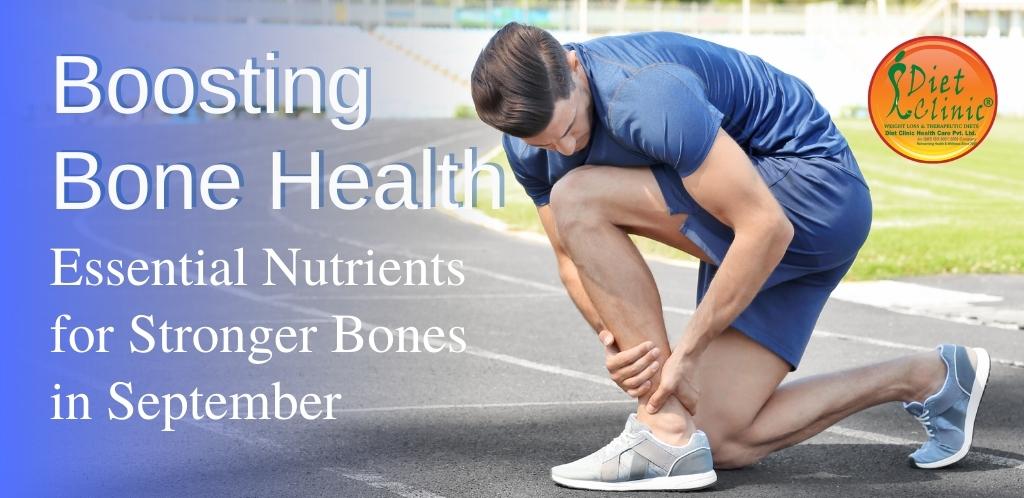
Dietician Sheela Seharawat
Boosting Bone Health: Essential Nutrients for Stronger Bones in September
September brings with it the subtle shift from the scorching days of summer to the mild and welcoming embrace of autumn. It's a season that encourages us to savor the changing colors of the leaves and the comforting aroma of hearty soups simmering on the stove.
While the transition to fall can be a delightful experience, it's also a reminder of the importance of taking care of our bodies, particularly our bones. As a dietician committed to promoting overall health, I'm here to emphasize the significance of bone health and share essential nutrients and strategies to strengthen your bones this September.
Understanding the Importance of Bone Health
Before we delve into the specific nutrients that support bone health, let's take a moment to recognize why it's crucial to care for our bones:
- Structural Support: Our bones provide the framework for our bodies, allowing us to stand, move, and carry out daily activities.
- Mineral Reserve: Bones act as a reservoir for essential minerals, particularly calcium and phosphorus, which are vital for various physiological processes.
- Blood Cell Production: Bone marrow within our bones is responsible for the production of red and white blood cells, which are necessary for oxygen transport and immune function.
- Protection: Bones shield vital organs, such as the brain, heart, and lungs, from injury.
- Endocrine Function: Bones release hormones that regulate various bodily functions, including blood sugar control and fat metabolism.
- Long-Term Health: Maintaining strong bones in youth helps reduce the risk of osteoporosis and fractures in later life
Now, let's explore the key nutrients that play a crucial role in promoting and maintaining strong and healthy bones.
Nutrient 1: Calcium
Calcium is perhaps the most well-known nutrient associated with bone health. It's a mineral that contributes to the structure and density of bones. Adequate calcium intake is essential to prevent conditions like osteoporosis and maintain bone strength throughout life.
Sources of Calcium:
- Dairy products (milk, yogurt, cheese)
- Leafy greens (kale, broccoli, collard greens)
- Fortified plant-based milk (almond, soy, rice)
- Sardines with bones
- Tofu made with calcium sulfate
- Fortified cereals
Recommended Daily Intake:
The recommended daily intake of calcium varies by age and gender. On average, adults should aim for around 1,000 to 1,200 milligrams of calcium per day.
Nutrient 2: Vitamin D
Vitamin D plays a crucial role in calcium absorption and bone health. Without sufficient vitamin D, your body struggles to absorb the calcium you consume, regardless of how much you get in your diet.
Sources of Vitamin D:
- Sunlight exposure (your skin can produce vitamin D when exposed to sunlight)
- Fatty fish (salmon, mackerel, sardines)
- Fortified dairy and plant-based milk
- Eggs
- Cod liver oil
- Some fortified cereals
Recommended Daily Intake:
The recommended daily intake of vitamin D varies by age and can range from 600 to 800 international units (IU) per day for adults. However, individual needs can vary based on factors like sun exposure and medical conditions.
Nutrient 3: Vitamin K
Vitamin K is essential for bone health as it helps in the production of osteocalcin, a protein that assists in bone mineralization. It also contributes to bone density.
Sources of Vitamin K:
- Leafy greens (kale, spinach, collard greens)
- Brussels sprouts
- Broccoli
- Cabbage
- Green beans
- Asparagus
Recommended Daily Intake:
The recommended daily intake of vitamin K varies, but for adults, it typically ranges from 90 to 120 micrograms per day.
Nutrient 4: Magnesium
Magnesium is a mineral that supports bone health by aiding in calcium absorption and bone mineralization. It's also involved in various enzymatic reactions that play a role in bone metabolism.
Sources of Magnesium:
- Nuts (almonds, cashews)
- Seeds (pumpkin seeds, sunflower seeds)
- Leafy greens (spinach, Swiss chard)
- Whole grains (brown rice, quinoa, oats)
- Legumes (black beans, chickpeas)
- Avocado
Recommended Daily Intake:
The recommended daily intake of magnesium varies by age and gender but typically ranges from 300 to 420 milligrams for adult men and 270 to 320 milligrams for adult women.
Nutrient 5: Omega-3 Fatty Acids
Omega-3 fatty acids, particularly the type found in fatty fish like salmon and mackerel, are known to support bone health. They have anti-inflammatory properties and may help reduce bone loss.
Sources of Omega-3 Fatty Acids:
- Fatty fish (salmon, mackerel, sardines)
- Chia seeds
- Flaxseeds
- Walnuts
- Hemp seeds
- Algal oil (a plant-based source of omega-3s)
Recommended Daily Intake:
There is no specific recommended daily intake for omega-3 fatty acids, but incorporating fatty fish into your diet a few times a week can provide substantial benefits.
Strategies to Promote Bone Health in September
- Balanced Diet: Ensure that your diet includes a variety of nutrient-rich foods that provide the essential vitamins and minerals needed for bone health. Focus on calcium-rich dairy or dairy alternatives, leafy greens, and sources of vitamin D and magnesium.
- Sunlight Exposure: Spend time outdoors to allow your skin to produce vitamin D from sunlight. Aim for about 15-20 minutes of sun exposure a few times a week.
- Supplements: If you have difficulty meeting your nutrient needs through diet alone, consider supplements. Consult with a healthcare provider to determine if you require supplementation and to establish the appropriate dosage.
- Regular Exercise: Engage in weight-bearing exercises like walking, jogging, dancing, and strength training. These activities stimulate bone growth and help maintain bone density.
- Limit Alcohol and Caffeine: Excessive alcohol and caffeine consumption can negatively impact bone health. Consume them in moderation.
- Quit Smoking: Smoking has been linked to reduced bone density. Quitting smoking can have a positive impact on your bone health.
September serves as a reminder to prioritize your bone health and incorporate these essential nutrients into your diet. By focusing on calcium, vitamin D, vitamin K, magnesium, and omega-3 fatty acids, you can strengthen your bones, reduce the risk of osteoporosis, and promote overall well-being.
Remember that bone health is a lifelong journey, and the choices you make today can significantly impact your future. Embrace a balanced diet, engage in regular physical activity, and maintain a healthy lifestyle to keep your bones strong and resilient. Invest in your bone health this September, and you'll reap the benefits for years to come.










